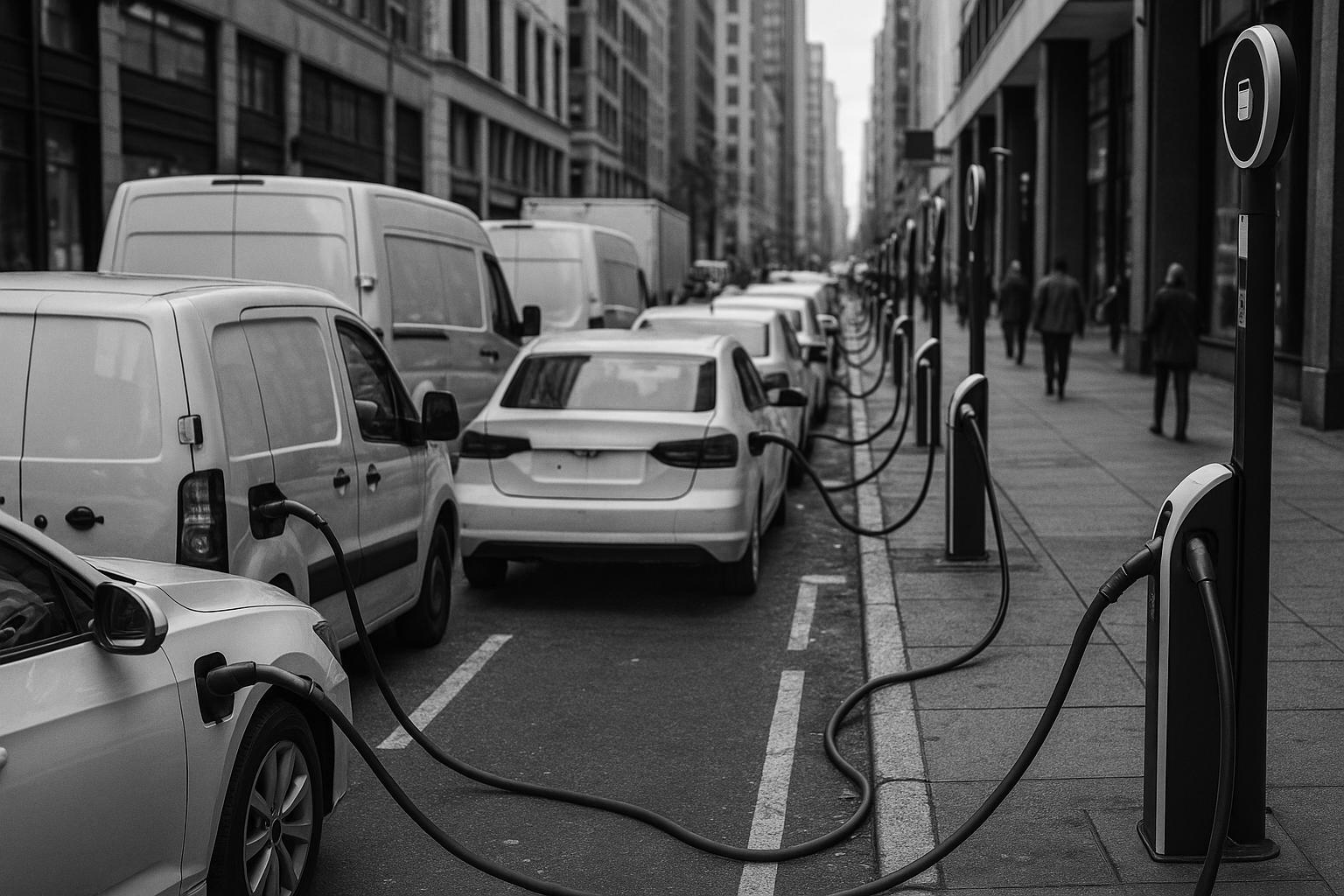Cenex, Uber, C40 Cities and the Greater London Authority launch pilot projects testing shared electric vehicle chargers to support Uber drivers, emergency vehicles and delivery fleets in London. The initiative aims to improve charger accessibility and affordability, helping high-mileage urban fleets switch to zero-emission vehicles by 2027.
Cenex, a specialist in low emission transport, has partnered with C40 Cities, Uber, and the Greater London Authority (GLA) to tackle a pressing challenge for electric vehicle (EV) drivers in urban areas: providing convenient, affordable charging solutions, especially for high-mileage vehicles frequently operating in London. This project concentrates on vehicles covering extensive daily distances, including Uber drivers, delivery services, and emergency vehicles. These groups often lack home charging options and require rapid, accessible public charging to maintain their demanding schedules in a city where public chargers can be costly, scarce, or inconvenient to reach.
The initiative seeks to trial innovative shared charging models that accommodate multiple fleet operators using the same infrastructure, based on variable demand throughout the day. For instance, a single charging station could serve Uber drivers at peak hours and NHS vehicles or courier services at other times. Cenex will implement three real-world pilot projects across London, meticulously analysing trial data to refine this shared-use approach and compile best practice guidelines. The intent is for these findings to help cities globally optimise existing charging infrastructure rather than solely expanding the number of chargers.
This collaborative project, running until February 2027, is part of a broader global effort, with similar trials underway in Boston and Phoenix. Juliette Kariuki-Cobbett, Project Lead at Cenex, remarked on the potential impact, stating that enabling shared usage of existing chargers is a crucial step to encourage electrification among high-mileage fleets and offers a scalable solution suitable for other major cities. Mark Watts, Executive Director at C40, emphasised the environmental benefits, noting that enhancing charger accessibility not only improves urban air quality and reduces noise but also helps the highest-mileage drivers transition to EVs, significantly cutting urban carbon emissions. London’s Mayor, Sadiq Khan, echoed these sentiments, highlighting the importance of supporting emergency services and essential transport through improved charging infrastructure to achieve a cleaner and fairer city.
This project aligns with Uber’s extensive commitments in London, where the company has pledged to fully electrify its fleet by the end of 2025. Uber has invested heavily in this goal, including a £5 million outlay to install over 700 fast EV chargers in the London boroughs of Brent, Newham, and Redbridge. These chargers are strategically located in areas with large driver populations, particularly benefiting those without home charging facilities. The investment forms part of a wider £145 million clean air fund dedicated to helping drivers acquire or rent EVs, supported by London’s suite of policies such as the Congestion Charge and the Ultra Low Emission Zone (ULEZ), which incentivise environmentally friendly vehicle choices.
Uber’s collaboration with C40 Cities extends beyond London to include Boston and Phoenix, aiming to support over 55,000 drivers lacking convenient access to charging in these cities. This partnership combines technical support, research, and advocacy to facilitate EV adoption among high-mileage drivers globally. By focusing on shared charging infrastructure and strategic deployment of chargers, the initiative addresses a key barrier to EV uptake in urban settings where private charging remains out of reach for many.
London’s efforts to promote EVs are further supported by well-established policies such as the Congestion Charge zone, operational since 2003, covering 21 square kilometres of the city centre. This zone charges most vehicles on weekdays but offers a 100% discount for full electric, hydrogen, and plug-in hybrid vehicles, encouraging their widespread use and improving urban air quality.
Together, these coordinated efforts between government bodies, private companies, and environmental organisations represent a comprehensive strategy to accelerate London’s progress toward zero-emission transport. By making EV charging more accessible, affordable, and efficiently shared among high-demand users, the city aims to foster a cleaner, healthier urban environment while advancing its climate and sustainability targets.
 Reference Map:
Reference Map:
- Paragraph 1 – [1], [3], [4]
- Paragraph 2 – [1], [3], [4]
- Paragraph 3 – [1], [4], [7]
- Paragraph 4 – [2], [5], [6]
- Paragraph 5 – [2], [6]
- Paragraph 6 – [7], [1]
- Paragraph 7 – [1], [2], [4], [5], [6], [7]
Source: Noah Wire Services
- https://airqualitynews.com/cars-freight-transport/search-for-charging-solutions-for-high-mileage-vehicles-in-london/ – Please view link – unable to able to access data
- https://www.uber.com/en-GB/newsroom/uber-strikes-new-deals-to-boost-ev-charging-access-for-drivers-and-couriers-in-major-us-and-european-cities/ – Uber has partnered with C40 Cities to enhance electric vehicle (EV) charging infrastructure in London, Boston, and Phoenix. This collaboration aims to support over 55,000 Uber drivers who currently lack access to convenient charging options. The initiative includes technical support, research, and policy advocacy to facilitate the adoption of EVs among high-mileage drivers. Additionally, Uber has invested £5 million to install over 700 fast EV chargers across London, focusing on areas with significant driver populations, thereby improving access for those without home charging facilities.
- https://fleetworld.co.uk/shared-charging-trials-for-high-mileage-fleets-in-london-begin/ – Cenex, in collaboration with C40 Cities and Uber, has initiated a project to develop and trial shared electric vehicle (EV) charging models for high-mileage fleets in London. The project involves setting up three real-world charging pilots to investigate how EV infrastructure can be shared among various operators, including taxi drivers, delivery fleets, and essential service providers. This approach aims to address the challenges of accessing convenient and affordable charging in high-density urban areas, where many drivers do not have access to home charging.
- https://businessmotoring.co.uk/c40-cenex-and-uber-begin-ev-infrastructure-sharing-pilot-in-london/ – C40 Cities, Uber, and Cenex have launched a 24-month electric vehicle (EV) infrastructure sharing pilot scheme for high-mileage fleets in London. The project, which began on 3rd June 2025, aims to investigate the implementation of EV charging infrastructure sharing between operators, informing the strategy of the Greater London Authority (GLA). Focusing on high-mileage fleets, the initiative seeks to boost public charging accessibility, as many Uber drivers do not have access to home charging and require rapid charging to minimize vehicle downtime.
- https://www.theguardian.com/environment/2023/jun/08/uber-aims-for-greener-trips-and-to-expand-london-electric-vehicle-fleet – Uber has announced plans to expand its electric vehicle (EV) fleet in London, aiming for a fully electric fleet by the end of 2025. The initiative is part of Uber’s broader efforts to promote greener trips and reduce emissions. The company has invested £145 million into a clean air fund, enabling drivers to purchase or rent EVs. The expansion is supported by London’s policies, including the congestion charge and ultra-low emission zone (ULEZ), which have incentivized the adoption of EVs among drivers.
- https://www.standard.co.uk/news/tech/uber/uber-electric-vehicle-charging-points-london-b1013271.html – Uber has invested £5 million to install over 700 electric vehicle (EV) chargers across three London boroughs—Brent, Newham, and Redbridge. This initiative aims to improve access to charging points for drivers without home charging facilities, thereby encouraging more drivers to switch to EVs. The investment is part of Uber’s broader strategy to support the transition to electric vehicles and contribute to cleaner air in London. The project is a collaboration between Uber and the respective London boroughs.
- https://www.c40.org/case-studies/c40-good-practice-guides-london-charging-zones-to-promote-ulevs/ – London introduced a Congestion Charge zone in 2003 to reduce high traffic flow in the city centre. The zone covers 21 square kilometres and operates on weekdays, requiring most drivers to pay a daily charge. Full electric, hydrogen, and plug-in hybrid vehicles qualify for a 100% Ultra Low Emission Vehicle (ULEV) discount, providing an incentive to own and operate these types of vehicles. This initiative is part of a comprehensive package of measures to reduce congestion and improve air quality in London.
Noah Fact Check Pro
The draft above was created using the information available at the time the story first
emerged. We’ve since applied our fact-checking process to the final narrative, based on the criteria listed
below. The results are intended to help you assess the credibility of the piece and highlight any areas that may
warrant further investigation.
Freshness check
Score:
8
Notes:
The narrative presents a recent collaboration announced on 5 August 2025, involving Cenex, C40 Cities, Uber, and the Greater London Authority to address electric vehicle (EV) charging solutions for high-mileage vehicles in London. This initiative is part of a broader global effort, with similar trials underway in Boston and Phoenix. The project is set to run until February 2027, indicating a long-term commitment. The content appears original and not recycled from previous reports. However, the narrative references earlier publications from June 2025, suggesting that while the core information is fresh, some details may have been updated or expanded upon. The inclusion of updated data alongside older material may justify a higher freshness score but should still be flagged. ([businessmotoring.co.uk](https://businessmotoring.co.uk/c40-cenex-and-uber-begin-ev-infrastructure-sharing-pilot-in-london/?utm_source=openai), [fleetworld.co.uk](https://fleetworld.co.uk/shared-charging-trials-for-high-mileage-fleets-in-london-begin/?utm_source=openai))
Quotes check
Score:
9
Notes:
The narrative includes direct quotes from Juliette Kariuki-Cobbett, Mark Watts, and Sadiq Khan. A search reveals that these quotes were first used in earlier publications from June 2025, indicating that they have been reused in this report. The wording of the quotes matches the earlier sources, confirming their reuse. This suggests that while the content is largely original, certain elements have been recycled. ([businessmotoring.co.uk](https://businessmotoring.co.uk/c40-cenex-and-uber-begin-ev-infrastructure-sharing-pilot-in-london/?utm_source=openai), [fleetworld.co.uk](https://fleetworld.co.uk/shared-charging-trials-for-high-mileage-fleets-in-london-begin/?utm_source=openai))
Source reliability
Score:
7
Notes:
The narrative originates from AirQualityNews, a specialist publication focusing on air quality and environmental issues. While the publication is niche, it is reputable within its field. The report cites multiple sources, including Uber’s official newsroom and other established outlets, enhancing its credibility. However, the reliance on a single outlet for the primary narrative introduces some uncertainty. Additionally, the report includes a ‘Reference Map’ with links to other sources, which may indicate a reliance on external content.
Plausability check
Score:
8
Notes:
The narrative presents a plausible and coherent account of a collaborative effort to improve EV charging infrastructure for high-mileage vehicles in London. The involvement of reputable organisations such as Cenex, C40 Cities, Uber, and the Greater London Authority adds credibility. The project aligns with ongoing global initiatives to promote EV adoption and addresses a known challenge in urban areas. The tone and language are consistent with official communications from the involved parties. However, the report’s reliance on a single source and the reuse of quotes from earlier publications may raise questions about the originality of some content.
Overall assessment
Verdict (FAIL, OPEN, PASS): PASS
Confidence (LOW, MEDIUM, HIGH): MEDIUM
Summary:
The narrative provides a detailed account of a recent collaboration aimed at enhancing EV charging infrastructure for high-mileage vehicles in London. While the core information is fresh and the involvement of reputable organisations adds credibility, the reuse of quotes from earlier publications and reliance on a single source introduce some uncertainties. The plausibility of the claims is supported by the context and the organisations involved. Given these factors, the overall assessment is a ‘PASS’ with medium confidence.













